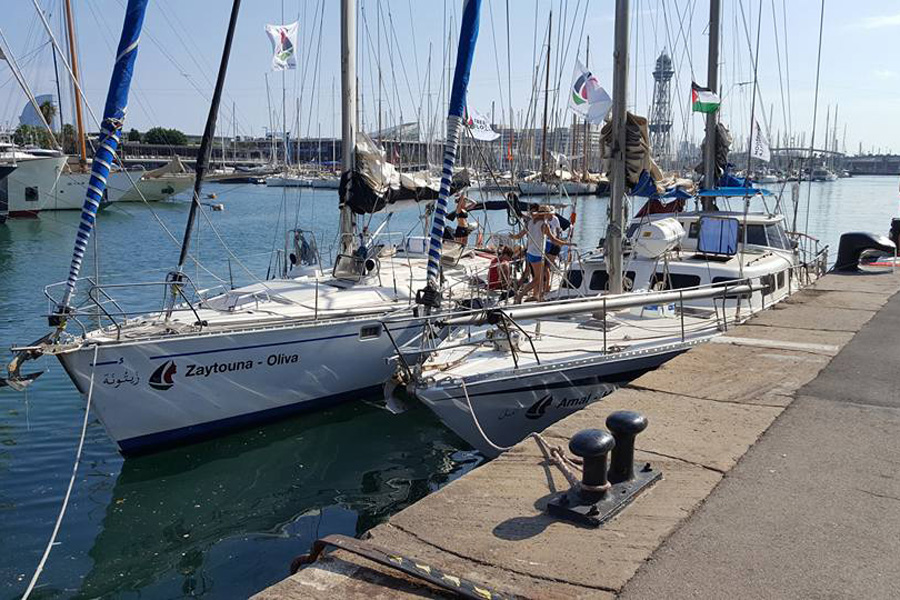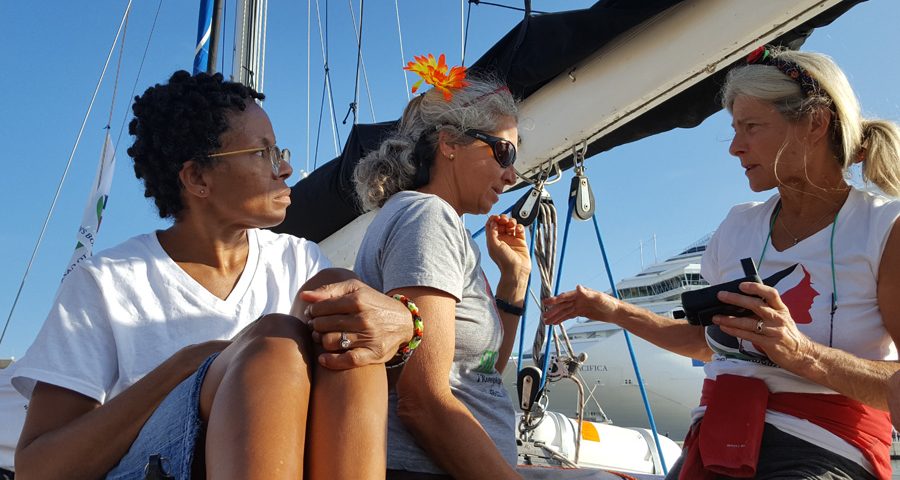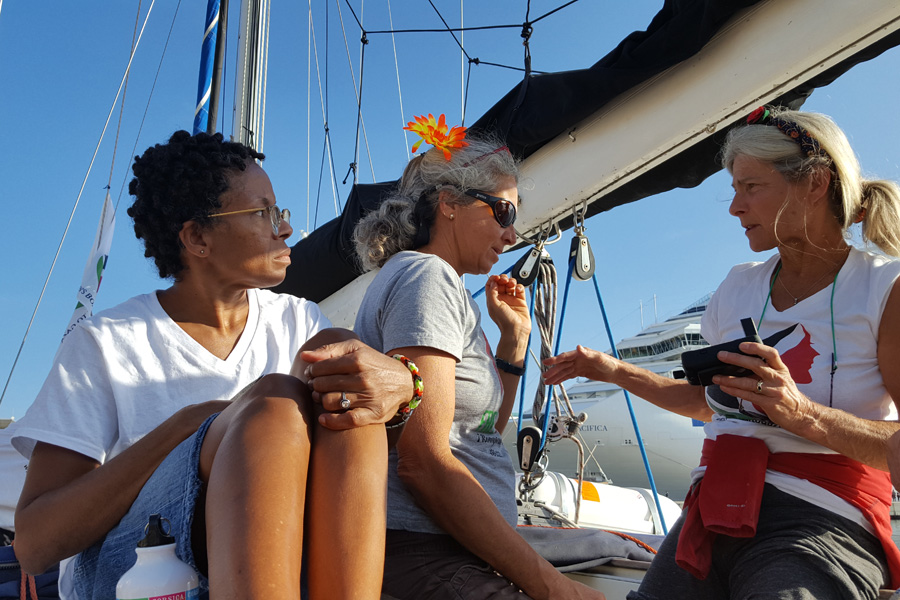Seven days on the Women’s flotilla to Gaza
Join reporter Yudit Ilany as she spends a week with the Women’s Flotilla to Gaza, while it makes port calls in southern Europe, and ultimately attempts to break Israel’s blockade on Gaza.
For eight years now, international activists have attempted to symbolically break Israel’s decade-long blockade on the Gaza Strip. In 2008, the Israeli Navy let two sets of boats through. Two years later, Israeli commandos killed 10 activists on the ‘Mavi Marmara.’
Every year since, activists have attempted new flotillas, all of which have been stopped by Israel. This year, the Freedom Flotilla Coalition is sending a ‘Women’s Boat to Gaza,’ a flotilla of two boats named Amal-Hope and Zaytouna-Oliva. Israel Social TV reporter Yudit Ilany is sailing on the Zaytouna-Oliva. This is her travelogue from the first week.
We have abridged Yudit’s diary here. The full multimedia ‘Travelogue’ is available on Social TV’s Facebook page.
Day 1 —Barcelona
It’s hot and humid. The sun is scorching but it’s easy to forget, as Barcelona is amazing. Not because it is a gorgeous city (well, that too) but first and foremost because of the city’s inspiring group of activists. People who give you hope not only with their words, but with their actions and dedication. And their friendliness.
The festival surrounding the launching of the flotilla, with its artists, musicians and performers, is a happy noisy mix of art, ideology and knowing how to live. The public is a fantastic mixture of locals of all kinds and creeds as well as random tourists, many of them visiting the city during the Eid al-Adha holiday.
And then there are the others, living in Barcelona after having travelled a less easy route: Muhammad, a young refugee born in Yarmoukh Camp in Syria, whose grandparents were born in Yaffa and lived in the Manshiye neighborhood, and his girlfriend from Aleppo, whose roots go back to Nazareth. Or Dr. Muhammad, a medical specialist working at a local hospital whose parents also came from Manshiye (Yaffa).
There is a fairly substantial Palestinian community in Barcelona that extends its hands to the refugees, in cooperation with many other groups of activists; One group specializes in finding good squats for refugees. They know where to look, how to go about it and are successful at what they are doing. Problem solved. They volunteer. The festival has been organized by volunteers, with incredible care, dedication and professionalism.
I live in Yaffa and love my city. You can take me out of Yaffa for a while, but you cannot take Yaffa out of me. Talking to Syrian refugees who have never visited, but love the city in a way I perhaps never can, makes me incredibly sad, then angry. They tell me about Manshiye where their grandparents lived and played on streets which no longer exist. The smell of orange blossoms replaced by the stench of diesel operated buses.
There is so much injustice.
The sailboat Amal-Hope arrived in Barcelona yesterday. Today the small boat on which my friends and I will be travelling, the Zaytouna-Oliva, will arrive. Olives are down to earth and deeply rooted.
Day 2 — Nonviolence and Catalonian Politics
The Israeli press reported yesterday that the Israeli government has asked the Spanish government to stop us from leaving the Barcelona harbor today. Catalonian politicians see things differently.
Yesterday, a delegation of the Women’s Flotilla to Gaza took part in a committee meeting in the Catalonian parliament. In my address to the committee, I described the dire situation in Gaza — a long list of dry facts, that cannot come close to describing the catastrophe of 1.8 million people living in an impossible situation.
Israel is responsible for that disastrous situation, which is worsening day by day.
The parliamentary committee (or work group, as they called it), in which all parties are represented, listened to our input and decided to present to parliament a proposal to demand that Israel stop its blockade of Gaza.
There is warm support for the flotilla in Barcelona. The send-off festival, organized by volunteers from many different groups, is amazing. The Israeli press, from what I have seen, talks about “anti-Israel propaganda”. By that standard, everything pro-human rights and pro-nonviolence is “anti Israel”, I guess.

The two boats, Amal and Zaytouna, which will sail to Gaza. (Yudit Ilany)
The last few days have been very hot and humid in Barcelona. Overnight, the temperature dropped and it rained. Today we sail and I hope for a calm sea.
Day 3 — The Ugly Shadow of Militarism
So Israel has finalized a 10-year arms deal with the U.S. Millions are being made and this is presented as a great success. The price to be paid is not by “them”, but by us, all of us, as the result of the bloody conflict which is already spiraling out of control. But who cares? They are making money and that is the point, the only point.
The dreadful arms-deal overshadows the wonderful send-off of the Women’s flotilla to Gaza from the Barcelona harbor. The Barcelona community with its many NGOs and activists as well as the city’s mayor, feminist Ada Colau of “Podemos,” national politicians, singers and bands.
Sailing out of the harbor to the sound of “Solo le pido a Dios” (translation of the lyrics) with tens of thousands of people along the long cay applauding us when passing by, was encouraging and empowering, providing hope and reasons for optimism.
On the flotilla are women from 17 countries aged between 26-76. The atmosphere on the boats is good, although conditions are cramped. I spent my first night watch with Fauzia, our doctor, who is from Malaysia. The night was cold but time passed by quickly, the biggest disturbance being two cats passing by lazily on the cays to which we were moored.
I’m on the smaller sailing vessel, the Zaytouna, the Oliva is named for the international activist observer boat of the same name, launched in 2011 to observe and monitor attacks by the Israeli navy on Palestinian fishermen and their vessels, who were often shot at, arrested and had their vessels impounded or severely damaged.
I believe in non-violent action and am proud of being on the Zaytouna, raising our voice against the blockade and in favor of peace, because there is no other way.
Days 5 & 6 — Out At Sea
The Spanish authorities raised a lot of bureaucratic trouble (Israeli authorities reportedly asked the Spanish government to stop us) so we had to literally sneak out of the Barcelona Harbor; we were followed by a “Guardia Civil” patrol boat until we reached Primera.
Had we not done so, we would have been stuck in Barcelona for the whole weekend — maybe much longer. And of course on Monday morning, they would have invented yet another reason for not allowing us to leave. It had become obvious that these were just pretexts for trying to stop the flotilla from departing. Our sister-ship, the Amal-Hope had left the day before but was forced to return after serious engine trouble.
We docked for a few hours in Primera, where we watched the sun go down and the spectacular full moon rise. After a few hours a last piece of official paper arrived (thank you Spanish activists for the fantastic logistics support) allowing us to formally leave Spain for a night of sailing on a quiet sea. By the time I got up for my night watch shift at 4 a.m. we were well into international waters on our way to France. Just as the sun rose, a huge shiny white passenger ship passed by. Excellent espresso (thank you Emma) helped me stay awake.
Grey clouds and a strong wind turned into a full blown gale of high, white capped waves crashing into the Zaytouna, who withstood them well. Our very experienced skipper (Tasmanian Madeleine, who has been the skipper on many refugee rescue missions in the Mediterranean with Médecins Sans Frontières) safely took us through the gale. For almost all of us however, it meant seasickness. Having to care for each other, created strong bonds.
Heavy rain, strong winds and high waves are fun to watch when you’re dry on the shore. It’s somewhat different aboard a 15-meter sailboat. But “in Gaza things are worse,” so who are we to complain? Expert care by our medic, Dr. Fauzia who herself didn’t feel too well, helped us through this difficult day. In spite of the occasional bouts of nausea, I enjoyed the drama of the waves crashing over the cabin roof window as well as watching the large white main sail.
Today, Saturday, the waves are still quite high but less “crazy.” The sailing is fast and as I’m writing this, it looks like we will be reaching Ajaccio in the early morning hours of Monday. We can already see the first weak outline of the Corsican coast.
Over the few days together we have become a close community, assisting each other, sharing things, talking politics, feminism as well as personal matters deep into the night. Yes, we are on a political mission, a demonstration like no other.
We hope to remind the world that the situation in Gaza is impossible, not “close to disastrous” but already beyond the horrific. More than that, we hope to remind people that it is Israel’s responsibility to lift the blockade. In Gaza 1.8 million people are kept imprisoned, there is no freedom of movement neither into nor out of the small strip of land. The Rafah border crossing with Egypt is open only a few days a month and the thousands waiting to cross are usually turned back. The crossings into Israel are closed to almost everyone.
After 11 years of blockade and three wars Gaza’s young generation do not know anything else. This situation cannot continue, may not continue.
Day 7 — Ajaccio, Corsica
The view is stunning. High mountains surrounding a blue bay. An ancient port town with pastel-colored houses along the quay side, the proverbial palm trees and many small boats in its marina, among them our Zaytouna. Two humongous cruise ships are moored not far from us.
A small group of local activists were waiting for us at 2 a.m. (thank you guys for the warm welcome). After a good night’s sleep we were interviewed by the local and national media. After a few days on a boat, the terra firma of the earth appears to shake and roll — a weird sensation.
Time for a walk about town in search of decent Wi-Fi to upload my video files — I’ve had very little luck so far. A storm last night wreaked havoc on the island’s communication systems. A large seagull is shitting on the Napoleon statue’s head in the central market square, delicious food and gaudy souvenirs, the usual mixture one finds in many tourist towns.
Through my phone I learn of the arrests of several Balad activists, yet another stage in Israel’s fight against political activists and the delegitimization of anyone with views different from the colonialist Zionist mainstream view. I also learn Justice Minister Ayelet Shaked is vilifying BDS activists.
Comparing a nonviolent tactic such as boycotting with terror is not only logic-defying but may well endanger the BDS activists themselves. It’s only a matter of time. And perhaps that is precisely what she is out to accomplish: another attempt at scaring us into silence.
Some women are leaving the flotilla today and others will be boarding later today, we come from so many countries. Many people from Gaza are following the flotilla and keep sending us messages of welcome. Thank you guys! I hope they will let us through.
A lot of work needs to be done on the Zaytouna, it’s amazing how many small things can falter when the weather gets bad: water seeping in through tiny holes in the cabin roof windows after yet another wave crashes on top of it. Our wind-electricity generator’s cord broken, lines and ropes managing the big sail need to be changed, we need to get bleach or some such for the toilets: I promised to clean all four of them (each cabin has its own) as the smell is somewhat… No need to share that particular fact in more detail. Gloves and bleach is all I wish for.
I’m watching the grey clouds coming in over the mountain range. When you are heading out to sea, that sort of thing occupies you.
Time to go back to the Zaytouna.
From +972






